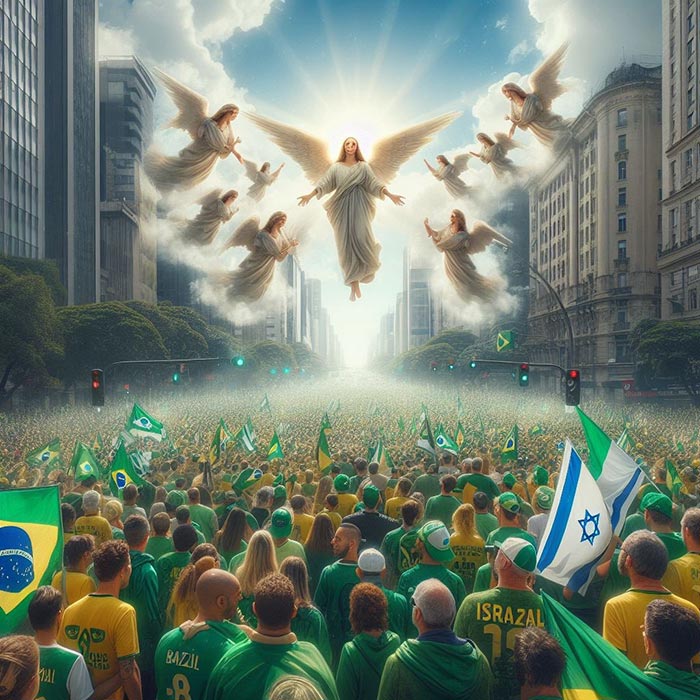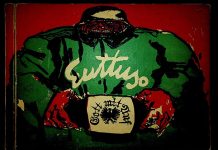
The historian and professor of comparative literature at the State University of Rio de Janeiro, João Cezar de Castro Rocha, dedicated himself to examining the discourse of the extreme right in an attempt to understand the reasons for the movement, its strategies and the paths that led to radicalization , all over the world and particularly in Brazil. A country that, according to him, would be “a global laboratory for the methodical creation of parallel reality”. Synthesized in books such as Guerra Cultural e Retórica do Odio, from 2021, and Bolsonarismo: da Guerra Cultural ao Terrorismo Doméstico, from 2023, his analysis treats radicalized discourse as a narrative process and suggests ways of interpretation and confrontation through dialogue and affection. In an interview with arte!brasileiros, he talks about the origins and consequences of the use of hate rhetoric, which combines absolute denial of diversity, cognitive chaos and the creation of a perverse mediasphere, strengthening an authoritarian and theocratic discourse of power.
arte!✱ – The Cultural War is one of the hallmarks of our recent history. How do you define the phenomenon?
João Cezar de Castro Rocha – Let’s think together. The cultural war is a spearhead of the transnational far right and is a very well articulated movement. The central idea is that, to truly come to power, you have to do so by winning hearts and minds. In other words, through culture. Hence the extreme right around the world has as its preferred targets the free press, art and universities: critical instances of reflection on reality. It is a kind of skewed, perverse reading of Antonio Gramsci's concept of hegemony. In 1992, Pat Buchanan (who ran in the Republican Party's presidential primaries) surprised the world when he said in his speech that this was not an election like the others: “We are fighting for the soul of America”, he literally says. The comparison here would be with Michelle Bolsonaro's speech at the demonstration on February 25th, in Paulista.
arte!✱ – They repeat this all the time, trying to feed this feeling of newness, pressure and war, so that they don't let their guard down.
All the time. It's a war for culture. And that has tremendous consequences. Because, if it is a war, we are not dealing with the other, the different, the diverse. We are dealing with the enemy. In a war, there is only one way to deal with the enemy. Delete it.
arte!✱ – And how can we, seen as the enemy, combat this attack? What is your method?
Firstly, we have to be aware that this war is ongoing. This is important because, sometimes, everything seems so delusional, so far from reality, that our tendency is not to pay attention to the articulated speeches. Here, I believe, my collaboration comes in. I have now discussed Dominion Theology a lot. I'm not a theologian, there are many people in Brazil who know the subject two hundred times more than I do. The contribution I try to make is to carefully analyze the discourse and the translation of the project behind that discourse. I work on the texts in detail, reading them two, three, five times, sometimes spending years thinking, looking for links that are not visible at first.
arte!✱ – Would it almost be a literary analysis of the phenomenon?
What I try to do is carefully analyze the speeches and, as I have training as a historian, I always try to contextualize them in the long term, over a long period of time. The cultural war, at first, is a reaction to the counterculture in the United States and also in Europe. In France, for example, it is a reaction to May 68. In the United States, to the hippie movement, but also to the Black Panthers. Counterculture, as a movement, ended up being assimilated by the very capitalism it challenged. But counterculture as an attitude affected the basis of the capitalist system. He gave up private property at all levels, especially in personal relationships; the counterculture considered experience, not possession, and not wealth, as the highest value. Wealth meant a rich experience and not a bank account. She also proposed a radical transformation in interpersonal relationships, the way women related to their husbands, etc. And the counterculture was identified in the cultural war mainly with the Frankfurt school. And this has a concrete reason: in World War II the most important thinkers of the Frankfurt School went to the United States: Adorno, Horkheimer, Lowenthal, Herbert Marcuse. If the former returned to Germany, Marcuse stayed in California, at the University of San Diego. Do you know who he had as a student? Angela Davis! Marcuse wrote works that were absolutely iconic and fundamental to the movement of '68. Again, what I try to do is establish these links that are almost narrative, almost a literary way of approaching the issue. Steve Bannon has a documentary, Generation Zero, that discusses the financial bubble, the housing crisis. Do you know who, for him, is to blame for the 2008 crisis?
It's from the Frankfurt School! Why this obsession? Because Marcuse, at the end of the 60s, was the inspirer of the counterculture, the guru of North American youth, of youth in Paris. The cultural war assumes that what is at stake, in fact, is a battle for the definition of civilization. And there is a complete embrace here: what is being defended is the Greco-Roman-Judeo-Christian civilization, understand that however you want.
arte!✱ – White, male, who does not question slavery, capitalism, colonialism, in other words, everything that needs to be questioned cannot be questioned.
That. As Machado de Assis said, “it is easier to appreciate the whip when you have the handle in your hand”. When it is wielded, not when it is received in the back. But let us remember that the cultural war predates the expansion of the digital universe, through the everyday ubiquity of social networks. Now, the extreme right is the great political phenomenon of the first two decades of the 2018st century. And it is very important to recognize here that the extreme right comes to power, at least for the first time, through free and democratic elections. Bolsonaro won the elections in 2016; in 55, Trump did not win the popular vote, but he won the American Electoral College; Viktor Orbán, who was left-wing in his youth – imagine that – also won the first election in Hungary; Javier Milei obtained XNUMX% of the votes in the Argentine election… What happens? The extreme right understood the unprecedented potential of social networks long before the progressive camp. And this potential is the production of cognitive chaos. Cognitive chaos due to excess information, not its absence. And social networks, in relation to the issue of time, produce something that if we don't understand, we won't be able to face.
arte!✱ – Is it like fighting a hydra, where you cut off one head and then three more are born?
You know I've been revisiting Sophocles' Oedipus the King. I have been rereading many classics to think about the contemporary situation. Oedipus deciphers the sphinx. That's the reference we always make, isn't it? But even with the sphinx deciphered, the ending of Oedipus is not happy. It is not enough to decipher the sphinx, contrary to what we think. The really new hypothesis that I propose is the following: what we call human, as a form of time and space operation, does not exist without temporal lag. What characterizes the human is the need for a time lag between the following acts: an action, its transmission, its reception and its subsequent interpretation. What social networks truly establish that is unprecedented in the history of human communication is the promise of impossible simultaneity. See, on social media, an act, an action, before being completed, is already transmitted; being transmitted, it is already received; and often the interpretation of the action that has not yet been completed impacts the course of the action itself. This axis of simultaneity produces a hermeneutic collapse. And see, there is no possibility of aesthetic experience without contemplation. But contemplation is a way of slowing down time. How many times, when faced with a story, a poem, a painting, a symphony, a ballet, do you have the impression that you switch off, close your eyes. You need time, don't you? Because what we call hermeneutics is the fundamental idea that between us, in the present, and the language of the past – although it is the same – a hole has opened up. There is no longer immediate communication, time has passed, the time lag is what makes us human. Is the world increasingly inhumane? Yes, because in this dizziness of a simultaneous time between action-transmission-reception-interpretation-impact, the extreme right does nothing.
arte!✱ – Authoritarianism follows a logic of pure and simple acceptance or denial. It's pure Manichaeism.
That's right, Manichaeism is pure verticality, it has no nuance. There is no time lag. Everything is here, now, already.
arte!✱ – Did you see the art produced by artificial intelligence to publicize the demonstration on February 25th in Paulista? They were created from a basic command. The power of the white man and divine power over this crowd.
I saw. Was that artificial intelligence?! It's unbelievable! In fact, there are practically only white people. Impressive. Look how crazy I realized now. There are two closed traffic lights, before you, and then they are all open, with the horizon in the background.
arte!✱ – You indicate in your books that after the pandemic, the cultural war is no longer the great and only weapon of the extreme right. Could you explain?
João Cezar de Castro Rocha – In the beginning, the cultural war was the most powerful electoral machine of the 21st century. At a time when the progressive camp did not yet understand the mechanics of social media, the extreme right produced cognitive chaos, initially through climate denialism. And after historical revisionism. In the presence of cognitive chaos there is only one possible response: it is pure affection. So the cultural war allows, paradoxically, to depoliticize the polis through the hyper-politicization of everyday life. The concrete result is that no one discusses polis projects anymore. Hence the importance of the customs agenda, which is very favorable for creating social panic. People stuck to customs do not deal with income redistribution, inequality, the utopia of a fairer world. No! In the customs agenda it goes like this: “tomorrow, your daughter at school will go into the bathroom and there will be a man”, “tomorrow, your son will receive a gender ideology class, etc.

arte!✱ – This recalls Damares’ fake speech about children victims of pedophilia in Marajó, for example.
Since you mentioned Damares, look at this example of collective cognitive dissonance. In 2013, Damares Alves – I have no difficulty recognizing that Damares is very charismatic and adored in certain evangelical communities – traveled the entire country as an advisor to the Evangelical Parliamentary Front to denounce the existence of the “gay kit”, which never existed. In 2018, Bolsonaro made use of this complaint and it is as if he came into existence. In other words, when a cognitive dissonance is made collective and millions of people embrace it, it becomes real. It's like Freud says when discussing error and illusion: error is an objective mistake, illusion is a mistake, but it is above all the projection of a desire. If I project my desire and that desire is also projected by 58 million people, it stops being an equivocation and becomes an objective political reality. The “gay kit” that never existed came into existence and was important in the 2018 campaign. All my work consists of trying to understand how, discursively, from a rhetorical point of view, the extreme right manages, in the first place, to transform the error in illusion. That is, capture the desire. Secondly, how it manages to transform illusion into collective illusion. And how can this be done? Through social networks.
arte!✱ – It’s almost a psychiatric diagnosis, isn’t it? Can we turn to several authors who think about the effects of this modernity to help reflect on this cognitive chaos?
Yes, it is a very difficult psychic issue. There are many thinkers who attribute long-term anthropological transformations to the introduction of powerful new means of communication. Raymond Williams – an important British cultural critic and one of the creators of Cultural Studies – has a book that is very little known in Brazil, On Television. At the beginning of this book, he says something very impressive. According to him, people think that a new means of communication is just another way of storing and transmitting data. He says no, that they can profoundly alter the perception of reality. And therefore, they have unpredictable anthropological consequences. See, you have a whole generation between the ages of ten and twenty, who spend ten to 12 hours a day with their cell phones in their hands, you get on the subway and people don't look at each other; you go to the restaurant and there are couples who don't talk. For the first time in the history of humanity there is a means of communication that can be used 24 hours a day, seven days a week. The book wasn't like that, television wasn't like that, cinema never was like that. Social agents, in the digital universe, have an extraordinary capacity to keep us hostage within them. This is the first time that a media outlet has done this. We need to start thinking about the anthropological consequences of this fact. A fundamental anthropological consequence is that art and literature become absolutely exceptional, something apart, because both literary reading and aesthetic contemplation depend on another enjoyment of time.
arte!✱ – In other words, is the utopian desire to universalize art also defeated?
Completely. For example, in these two images that you showed, it is a kind of incredible throwback to a conception of literature or academicism of art. It is curious to think to what extent the extreme right has a very acute understanding of this transformation and uses it. Because, to a large extent, the extreme right's cultural war is an advanced arm of the savage neoliberalism we live in today, a neoliberalism that faces for the first time in a concrete way the need to recognize that natural resources are not unlimited, as was believed.
arte!✱ – Let’s talk about Brazil again. In addition to this new flavor of social networks, we have another specificity, which is this eternal return to the issue of military dictatorship and the strength of neo-Pentecostalism. Do you see a certain weakening of the cultural war?
This is somewhat the basic hypothesis of my last book. Since the campaign, until the beginning of 2020, the Bolsonaro government has been the government of the cultural war. That is, a machine for producing narratives that, based on “fake news” and conspiracy theories, constantly invents enemies that must be eliminated. And this keeps the militancy permanently mobilized. The cultural war is a powerful electoral machine, because it is a powerful narrative machine of radicalizations: good and evil, the righteous and the wicked, etc. It seems to me that, with the pandemic, something fundamental broke. Because, in the beginning, the reaction – both in the United States and in Brazil, Trump and Bolsonaro – was to either minimize or deny the pandemic. In Brazil, Carla Zambelli had the courage to spread “fake news” that coffins were buried with stones and not bodies. And Bolsonarists disputed narratives about the origin of the virus, about the number of deaths, about statistics, as if it were just another meme. It turns out that there was a moment all over the world when the deaths from Covid stopped being numbers. They became faces: my cousin, a close relative, a childhood friend. The dead are no longer disputed as narrative objects, because they start to affect us all. When this happens, the cultural war loses a lot of its validity, because it is not possible to transform life into a simple narrative dispute, especially when your father, your brother dies... There is a limit to cognitive chaos.
arte!✱ – In a way, we are seeing the same thing in Palestine, right?
And that! There is a limit to the narrative dispute and the limit is what made us human: the awareness of finitude. Because the extreme right is so perverse, but so intelligently perverse, that it thrives because it appropriates two differentiating characteristics of the human condition. See, if we talk about human, we necessarily talk about narrative. There is no human group contacted by anthropologists that does not have a special way of describing a world, of describing themselves, the origin of things. It is the narrative as the very essence of the human. Secondly, finiteness. That is, the awareness that we have that we are, yes, beings for death. The extreme right uses both things in a very perverse way. In the pandemic, finitude failed. The cultural war stopped being a dispute over narrative and became a way of life. It is not enough to dispute narratives about the number of deaths, it is necessary to take a chloroquine kit. The narrative about coffins buried with stones is not enough, it is necessary to wear a mask in a deliberately wrong way, on the forehead, on the chin and never on the respiratory tract. The cultural war was losing its place in life.
arte!✱ – Does it surpass itself through its own radicality?
That. It takes on a religious character.
arte!✱ – We’ve reached tire lovers…
And to those who seek help from aliens. Do you remember how they used to place their cell phones horizontally over their heads? You know why? Because, if it were vertical, how would the aliens read the SOS request?! Cognitive dissonance in vein. The same thing happened in the United States. Support is now less the worship of a political myth and more the veneration of the religious leader. The Economist magazine published an article earlier this year saying that the majority of Trump's supporters believe he is God's chosen one.
arte!✱ – In a way, did this happen at the Paulista demonstration, including this passing of the baton from Jair Bolsonaro to Michelle Bolsonaro?
Yes. One very symptomatic thing: many deputies and former ministers were barred. Mário Frias, Ricardo Salles, Júlia Zanatta, Carla Zambelli, Bia Kicis, Osmar Terra did not join the electric trio: all those who are radically Bolsonarists from the point of view of the cultural war. Those who rose have a stronger association with neo-Pentecostalism, with religion. Michelle Bolsonaro's speech is blatantly unconstitutional, because she proposes the submission of the secular state to religion. It is about the submission of the state and public policies to the doctrine it defends. And you realize that there comes a time when the cultural war is no longer enough, because the category it brought to deal with this is the category of evil. Evil is a fascinating question, which is at the origin of Dostoevsky's Crime and Punishment. It's fundamental in Brothers Karamazov too. How to understand it in its essence, in its radicality? It is a philosophical, literary and theological question. Evil as a category has no place in politics. Because politics is the art in the polis of negotiating differences. Bringing the category of evil into politics is radically denying politics. This is to say that what is desired is a state that has a theocratic character and a fundamentalist vocation. It is the cultural war finally transformed into a spiritual battle. It's no small threat.
arte!✱ – And what about the art in this battle?
Nobody knows the answer. What I've been thinking is that we need a double perspective: short, medium and long term. What I am going to say now is not understood by many, but it is life. I really want to be able to talk to Bolsonaro supporters at a table soon. Preferably, as Deleuze said, at a round table, which is the table proper to philosophy. In the medium and long term, education, art and literature will be unavoidable. But in the short term, for the medium and long term to be possible, for the generous perspective to have time to develop, I only see one alternative: the rigor of the law. If there is no rigorous punishment for the organizers of the coup, financiers, military police, generals who acted by action or omission, we will return to the eternal dilemma of the unresolved memory of the 1964 military dictatorship. That is, how the military were never punished because they imposed blackmail to allow redemocratization, the amnesty of August 1979. If this is repeated now, they will return much stronger in 2026. Without this rigorous perspective, the delusion of the Bolsonarist extreme right will not know the fundamental point for its overcoming, What a reality check! Those who are now facing very serious sentences have understood, in the most traumatic way possible, that the world is not limited to WhatsApp.
arte!✱ – A story that gave me hope was that of the flat-earther who, through personal experience, discovered that the earth is round. Do the Bolsonaristas with whom you would sit at the table have this perspective of overcoming things?
That's why I was inspired too! As for the Bolsonarists, I must express myself better here. I propose that we make a distinction between Bolsonaro voters and Bolsonarists. A Bolsonarista is someone who, for example, idolizes Carlos Brilhante Ustra, who is sexist, homophobic, transphobic, who has no concern with equality in any instance and who always believes in the law of the strongest. For this reason, he is an ardent supporter of armaments. With these people, it is very difficult to think about dialogue, because there are practically only differences. And these people are not necessarily interested in listening to something that is not a reflection of their convictions. But I believe that in the 58 million votes that Bolsonaro received on October 30, 2022, not even 20% fit into this category. And I say based on something very concrete. The moment of greatest decline in Bolsonaro's popularity during the pandemic, he fell precisely to 20% approval from the electorate, when neo-Pentecostal support became decisive for him to maintain any political possibility. And I differentiate these Bolsonaro supporters from the eventual Bolsonaro voter. This is someone who is unhappy with the system, or a radical anti-PT member, or someone whose daily life has not really improved much in recent years. Because there is a real difficulty in the daily lives of the most vulnerable people in Brazil. With these, I believe, it is possible to talk. Talking, however, does not mean that they will become left-wing voters. They have every right to be right-wing, center-wing, liberal. The problem only arises when dialogue becomes unfeasible due to the other's intention to eliminate everything that is not the mirror. But I will repeat: for this to be possible in the short term, a rigorous perspective is strictly indispensable. Especially in a country that has such an unresolved memory of the military dictatorship, a country that was not able – even during redemocratization – to judge the crimes committed by the armed forces during the dictatorship. In this sense, an amnesty today, in 2024, would only reinforce the coup and authoritarian tendency of these same armed forces and all civilians who actively supported the coup movement.
arte!✱ – I would also like to know how you decided to delve into this monitoring of the networks, of the Bolsonarista mediasphere.
As a trained historian, I have always been very interested in the military period. And I read a lot on the subject. Furthermore, at my university, two colleagues who I always respected greatly for their intelligence, correctness, and integrity, began in 2017 to send messages that I considered curious. To make a long story short, they became radical Bolsonarists, which surprised me a lot. So I began to become interested in trying to understand the phenomenon, how these people had allowed themselves to be so ensnared by such obviously mistaken conspiracy theories.
arte!✱ – You always say that you promised yourself not to get sick. What does that mean?
This point of not getting sick was very important for me. I didn't have social media, I didn't have Twitter or Instagram. There was only Facebook. I joined both in February 2020 and began to study the culture war in more depth. When I thought I had some understanding of what was going on. I decided to start participating in the public debate more actively. He took it as a civic commitment to decipher the Bolsonarist sphinx. In fact, initially it was a sphinx, because it was not understood exactly how the man who was so obviously limited from a cognitive point of view, from the point of view of basic knowledge, how it was possible for him to excite such a large number of people, who saw him literally like a leader, a myth. So there was this initial desire for understanding and this desire, once I joined social media, for me it was very important to not allow myself to start engaging in the same behavior. And I believe that many comrades on the left have not always managed to successfully avoid what I call this illness, that is, in this necessarily aggressive, violent way, the inability to listen to others, the inability to accept that someone disagrees with your opinion. In other words, this radicalization, this desire to reduce the world to a mirror, which the extreme right ultimately achieves. And it's curious, because the extreme right has many structural affinities with the universe of social networks itself. To some extent, the operation of the algorithm is the far-right worldview itself. ✱













